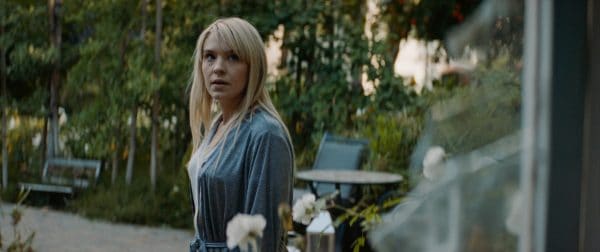Lucky, 2021.
Directed by Natasha Kermani.
Starring Brea Grant, Hunter C. Smith, Dhruv Uday Singh, Yasmine Al-Bustami, Kauser Mohammed, Leith M. Burke, and Larry Cedar.

SYNOPSIS:
Life takes a sudden turn for May (Brea Grant), a popular self-help book author, when she finds herself the target of a mysterious man with murderous intentions. Every night, without fail he comes after her, and every day the people around her barely seem to notice.

Sometimes it can feel like we’re stuck in a time-loop of our own, what with the amount of films employing the Groundhog Day template; Palm Springs did it for laughs, as did Netflix’s Russian Doll, while we’ve already seen the terrific Happy Death Day tick the masked slasher stalking final girl box. This means home-invasion horror Lucky also needs more than just this familiar gimmick to ensure that it cuts deep enough to scar.
Our final girl is May, who is told in emotionless, automaton fashion by her husband that “a man comes into our house every night and tries to kill us”. It seems perfunctory to him, grabbing a golf club and stating “we have to fight for our lives now”. It’s deeply unsettling, for May and the audience alike, and symptomatic of a film which sustains its short gut-punch run time with a burgeoning sense of unease, rather than any shock tactics or a reliance on jump scares.
The mood is built in a number of ways by sophomore director Natasha Kermani (Imitation Girl). Lucky has this strange air of sterility to it, a coldness which heightens the isolation May feels as this strange new world begins to envelop her. Characters are introduced a little like they’re playing a role in something bigger, and there’s a real The Truman Show vibe to how they interact with May, which helps to crank up the anxiety levels.

Complimenting the tone of the film is Jeremy Zuckerman’s terrific score, which veers from John Carpenter style 70s synths, to this hard-to-describe choral sound which signals impending danger. It’s really effective in getting under your skin.
However, Lucky‘s success can be found in the way that it acknowledges and laughs at the tropes that a slasher film would ordinarily thrive on, such as the downed killer miraculously vanishing as the protagonists look away – “Oh, he’s probably gone already” – and instead decides to imbue this Stepford Wives world with smarts over scares, planting the seeds of something altogether more troubling than simply a man in a mask.
When things start to go bump in the night, May is quickly abandoned by her husband, and despite attacks on three consecutive nights, the police refuse to take her word for it. Everyone seems to accept the fact that this is just what the man does. At work, where she is struggling to come up with ideas for a new book, her genuine talent is dismissed as good fortune. Slowly, this exaggerated world full of “you’re so brave” and “this is how things are” becomes the recognisible norm, and that’s where the real terror can be found.
To say much more would veer into spoiler territory, but everything from harassment, accountability, and the abandonment of women left to deal with their perceived failure and trauma, is all wrapped up in Brea Grant’s clever script, and although the lack of resolution for its central character is frustrating, that’s also the larger point of the movies #MeToo message.
Yet another refreshing twist on the time-loop tale, Lucky is an effective empowerment fable, one which works both as a conversation starter, and an enjoyable slice of home-invasion horror.
Flickering Myth Rating – Film ★ ★ ★ ★/ Movie ★ ★ ★ ★
Matt Rodgers – Follow me on Twitter












